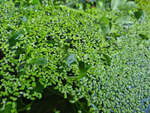We just grew out some super nice Lemna Minor, so we are having a bit of a sale this week for it!
$4 for a 5cm diameter clump of the floating leaves.
Low-high light, CO2 and Fertilizers are not needed.
Fast growing, quickly grows to cover the surface.
Floating plant, so floats on the surface.
Duck Weed is great for keeping your aquarium clean and removing nutrients from the water. Its main down side is that it covers the surface of the tank blocking light from reaching the plants below it. You can get around this by removing some or leaving a floating "ring" on your aquarium to keep them out from inside or outside it.
This is also the lats week for our snail deals, so check those out here.
If you have any questions or problems feel free to comment!


Check the spelling of Diamitir on your listing
Should be diameter 👌